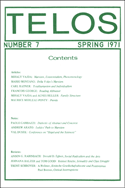For many today, Claude Lefort is a thinker known mainly by association, someone whose work emerges where others are asked to situate their projects relative to his thinking of the political. He is a prominent, if not central, figure for the more post-structuralist thinkers of radical democracy. Lefort’s sense of democracy—as that form of society where the place of power is empty—is vital to those projects that would likewise tie democracy to the symbolic character of power, and to the distinct workings of politics and the political. Interestingly, while debate over the correct translation of le or la politique seems to almost always return to Lefort, it remains the case that for his own part Lefort was never much interested in post-structuralism. For him, the post-structural turn, itself bound up with the legacies of May 1968 and the new knowledge, obfuscated almost as much as it made clear.
|
As an occasional feature on TELOSscope, we highlight a past Telos article whose critical insights continue to illuminate our thinking and challenge our assumptions. Today, James Santucci looks at François George’s “Reading Althusser,” from Telos 7 (Spring 1971). François George believes that Louis Althusser does not deserve his reputation, and he wants to prove it to you. He writes:
|
||||
|
Telos Press Publishing · PO Box 811 · Candor, NY 13743 · Phone: 212-228-6479 Privacy Policy · Data Protection Copyright © 2025 Telos Press Publishing · All Rights Reserved |
||||
 Since the mainstay of [Althusser’s] thought is its “rigor,” we will demonstrate that it is the least rigorous of all, taking as the principal example his recent work, Lenine et la Philosophic. The occasion for the following discussion is a conference in an extremely academic context: the French Society of Philosophy. Naturally, Althusser feels uneasy in this situation. Marxists, for whom thought should be practical, must seek to transform society rather than to exert themselves in these closed contexts. Was he forced to attend? Althusser accepts his role only by dismissing it. . . . Why has he come, if he rejects this degraded form of philosophy and human relations? He is interested only in the justification of this rejection or, in his own words, this denial: “the only possible communications and discussions are scientific ones.” Under the pretext of attacking the meaninglessness of the philosophical gatherings in which he participates, Althusser rejects all non-scientific human communications as a scientist addressing a “scientific society.” Evidently, then, Althusser attends the French Society of Philosophy conference because he lacks the qualifications required by the international congress on astrophysics. All would go well, said Proudhon, when the government’s power was replaced by that of the Academy of Sciences—which should not be confused with the workers’ councils. (73–74)
Since the mainstay of [Althusser’s] thought is its “rigor,” we will demonstrate that it is the least rigorous of all, taking as the principal example his recent work, Lenine et la Philosophic. The occasion for the following discussion is a conference in an extremely academic context: the French Society of Philosophy. Naturally, Althusser feels uneasy in this situation. Marxists, for whom thought should be practical, must seek to transform society rather than to exert themselves in these closed contexts. Was he forced to attend? Althusser accepts his role only by dismissing it. . . . Why has he come, if he rejects this degraded form of philosophy and human relations? He is interested only in the justification of this rejection or, in his own words, this denial: “the only possible communications and discussions are scientific ones.” Under the pretext of attacking the meaninglessness of the philosophical gatherings in which he participates, Althusser rejects all non-scientific human communications as a scientist addressing a “scientific society.” Evidently, then, Althusser attends the French Society of Philosophy conference because he lacks the qualifications required by the international congress on astrophysics. All would go well, said Proudhon, when the government’s power was replaced by that of the Academy of Sciences—which should not be confused with the workers’ councils. (73–74) 

